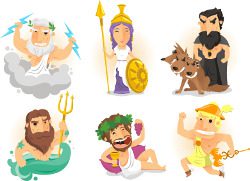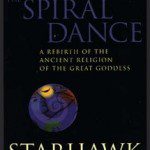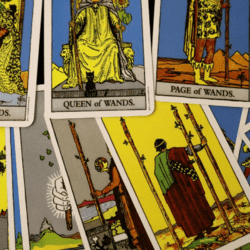This one is long — crazy long — so I’m putting some housekeeping at the top before I lose you, dear reader.
My deep thanks to departing Patheos Pagan managing editor Christine Hoff Kraemer for bringing me on board, and congratulations to Jason Mankey as he takes up the mantle (or the yoke).
And thanks to Jason and his brilliant and lovely wife Ari for encouraging me to get out to Pantheacon this year, and for hospitality after the con. My next scheduled events are the Free Spirit Gathering (my home event, where I’ll be Mastering the Ceremonies once again) in June in Maryland, and Starwood (where I’ve been invited to present, details TBD) in July in Ohio.
Pantheacon shout-outs also go to the friendly folks I met from OBOD and ADF, Clifford Hartleigh Low and the Green Fairy folks, Sabrina, Jesamyn, Angus, Chris Chandler (now that was an unexpected meeting), and everyone who came to my workshop or bought my book or applauded my music at the Bardic Circle. And the hard-working con staff. Thanks all for making me feel welcome.
And thanks to Mark Green and John Halstead and the other folks at the Atheopagan talk which inspired this week’s topic. And now, on with the show…
Pagan Atheist???
I have been confidently identifying myself both as an “atheist” and a “Pagan” (among other labels) since at least 1997. Maybe longer, but that’s as far back in my e-mail archives that I can find myself stating it explicitly.
In the spaces that I frequented in those days, it was not a controversial stance. My real-world Pagan community was my own eclectic circle where we had Christo-Pagans and self-initiated Wiccans and folks into Druid stuff and I was throwing in bits of Taoism and Zen — who was going to argue?
On-line, we had the net but the web hadn’t become a big thing yet. Most of us were still on dial-up and blogs were still years away. We didn’t even have MySpace yet, let alone Facebook and Twitter. USENET newsgroups and private mailing lists were where the important discussions happened, and regularly posted FAQ (“Frequently Asked Questions”) documents were important works of the on-line culture.
And that culture was still weighted towards programmers, engineers, and scientists. We were still griping about “The September That Never Ended”, when AOL suddenly let a bunch of non-technical people into our party.
So the “Frequently Asked Questions about Neopaganism” written by hacker Eric S. Raymond had some authority with on-line Pagans. It stated: “[M]any neopagans are philosophical agnostics or even atheists; there is a tendency to regard `the gods’ as Jungian archetypes or otherwise in some sense created by and dependent on human belief, and thus naturally plural and observer-dependent.”[Raymond, “Neopagan”]
(Raymond — or ESR, as we hackers know him — was a Wiccan priest at one point, and also a devotee of Zen, so his 1995 essay-length spiritual autobiography “Dancing With the Gods”,[Raymond, “Dancing”] is an excellent read for Zen Pagans. Unfortunately he sort of went nuts after 9/11, falling into paranoid conspiracy theories, Islamophobia, and climate change denialism; [Raymond, “Why”; “Eric S. Raymond”; “#1054…”] my citation of his older work here is most definitely not an endorsement of this more recent batshit craziness. May he be healed.)
I got no push-back on my “Pagan atheist” identification more severe than an occasional raised eyebrow — and even those mostly came from Christians upset at my double heresy.
“Pagan” and “atheist” have both been part of my presenter bio for about thirty-five events (counting each year’s edition of annual ones separately) spread over a decade and a half now. Neither the Pagan Police nor Atheist Agents have yet come to take me away.

I don’t know if times are changing, or if it’s an east coast/west coast thing, or something that’s mostly in the Pagan blogosphere. Or maybe also including “Zen” and “Taoist” and “Discordian” in that bio have made me seem non-threatening to people so I haven’t been drawn into the conflict. But when I made it out to PantheaCon recently and heard from such prominent atheist/humanist Pagans as Mark Green (of Atheopaganism fame) and John Halstead (The Allergic Pagan next door here at Patheos), I was surprised at some of the travails they related, people telling Pagan atheists that they are not valid Pagans.
In fact the intersection of atheism and Neo paganismgoes back centuries. One root of the Neopagan movement was the poetry of British Romantics. Percy Bysshe Shelley was part of a social set that sought a replacement for Christianity and helped shape our Neopagan notions of the deities;[Hutton 23-25] he wrote of the “Sacred goddess, Mother Earth / Thou from whose immortal bosom / Gods and men and beasts have birth”,[Shelley] and once raised an altar to Pan and wrote of such worship as the “true religion”[quoted at Hutton, 25]. But he was also a devoted amateur scientist and was expelled from Oxford for writing a tract titled The Necessity of Atheism (He was also a vegetarian and an anarchist. I love this guy!)
As happy as I was to meet some other atheist Pagans, I was struck by something about the language that Mark Green uses. He speaks of a distinction between “believing…gods to exist in a literal sense” and seeing them as “meaningful metaphors”.[Green]
With all respect to Mark, I think that doesn’t quite catch it. Metaphor is a literary device, it’s something that we recognize intellectually. It seems to me weak tea for discussing the Shining Ones.
I think we need to look deeper and do some philosophy. To answer the question “Do the deities exist?”, we need to answer two questions, just two trivial little matters:
- What is a god?
- What does it mean to exist?
We have here two fundamental questions of theology and ontology that have had philosophers quibbling for thousands of years.
So, what the heck, there’s already so much gibberish on these topics that I don’t think I can make the problem any worse!

















